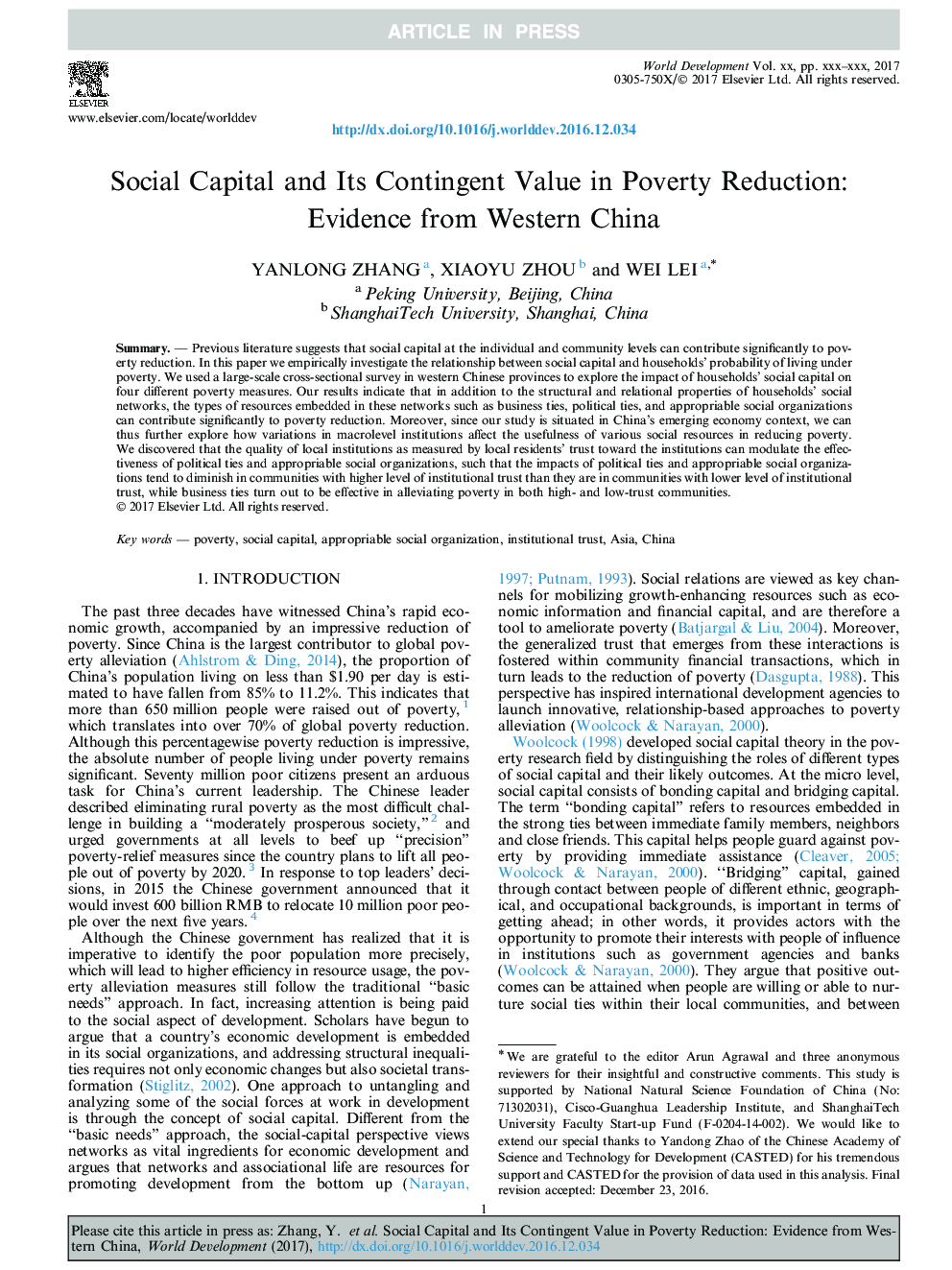| کد مقاله | کد نشریه | سال انتشار | مقاله انگلیسی | نسخه تمام متن |
|---|---|---|---|---|
| 5105311 | 1481125 | 2017 | 12 صفحه PDF | دانلود رایگان |
عنوان انگلیسی مقاله ISI
Social Capital and Its Contingent Value in Poverty Reduction: Evidence from Western China
ترجمه فارسی عنوان
سرمایه اجتماعی و ارزش احتمالی آن در کاهش فقر: شواهد از چین غربی
دانلود مقاله + سفارش ترجمه
دانلود مقاله ISI انگلیسی
رایگان برای ایرانیان
کلمات کلیدی
فقر، سرمایه اجتماعی، سازمان اجتماعی مناسب اعتماد سازمانی، آسیا، چین،
ترجمه چکیده
ادبیات قبلی نشان می دهد که سرمایه اجتماعی در سطوح فردی و اجتماعی می تواند به طور قابل توجهی به کاهش فقر کمک کند. در این مقاله تجربی رابطه میان سرمایه اجتماعی و احتمال زندگی در فقر را در خانوارها مورد بررسی قرار می دهیم. ما از یک بررسی مقطعی در مقیاس بزرگ در استان های غربی چینی استفاده کردیم تا تاثیر سرمایه اجتماعی بر خانواده ها را بر چهار شاخص فقر مختلف بررسی کنیم. نتایج ما نشان می دهد که علاوه بر خواص ساختاری و ارتباطی شبکه های اجتماعی خانوارها، انواع منابع موجود در این شبکه ها مانند روابط تجاری، روابط سیاسی و سازمان های اجتماعی قابل اعتماد می توانند به طور قابل توجهی به کاهش فقر کمک کنند. علاوه بر این، از آنجا که مطالعه ما در چارچوب اقتصادهای در حال ظهور چین قرار دارد، می توانیم به بررسی بیشتر این که چگونه تغییرات در موسسات مکانیکی بر سودمندی منابع اجتماعی مختلف در کاهش فقر تاثیر می گذاریم. ما کشف کردیم که کیفیت مؤسسات محلی با توجه به اعتماد ساکنان محلی به موسسات می تواند اثربخشی روابط سیاسی و سازمان های اجتماعی مناسب را مد نظر قرار دهد، به طوری که تأثیر روابط سیاسی و سازمان های اجتماعی مناسب می تواند در جوامع با سطح بالاتری از اعتماد نهادی نسبت به جوامع با سطح پایین اعتماد نهادی، در حالی است که روابط تجاری در کاهش فقر در جوامع پر درآمد و کم اعتماد موثر است.
موضوعات مرتبط
علوم انسانی و اجتماعی
اقتصاد، اقتصادسنجی و امور مالی
اقتصاد و اقتصادسنجی
چکیده انگلیسی
Previous literature suggests that social capital at the individual and community levels can contribute significantly to poverty reduction. In this paper we empirically investigate the relationship between social capital and households' probability of living under poverty. We used a large-scale cross-sectional survey in western Chinese provinces to explore the impact of households' social capital on four different poverty measures. Our results indicate that in addition to the structural and relational properties of households' social networks, the types of resources embedded in these networks such as business ties, political ties, and appropriable social organizations can contribute significantly to poverty reduction. Moreover, since our study is situated in China's emerging economy context, we can thus further explore how variations in macrolevel institutions affect the usefulness of various social resources in reducing poverty. We discovered that the quality of local institutions as measured by local residents' trust toward the institutions can modulate the effectiveness of political ties and appropriable social organizations, such that the impacts of political ties and appropriable social organizations tend to diminish in communities with higher level of institutional trust than they are in communities with lower level of institutional trust, while business ties turn out to be effective in alleviating poverty in both high- and low-trust communities.
ناشر
Database: Elsevier - ScienceDirect (ساینس دایرکت)
Journal: World Development - Volume 93, May 2017, Pages 350-361
Journal: World Development - Volume 93, May 2017, Pages 350-361
نویسندگان
Yanlong Zhang, Xiaoyu Zhou, Wei Lei,
